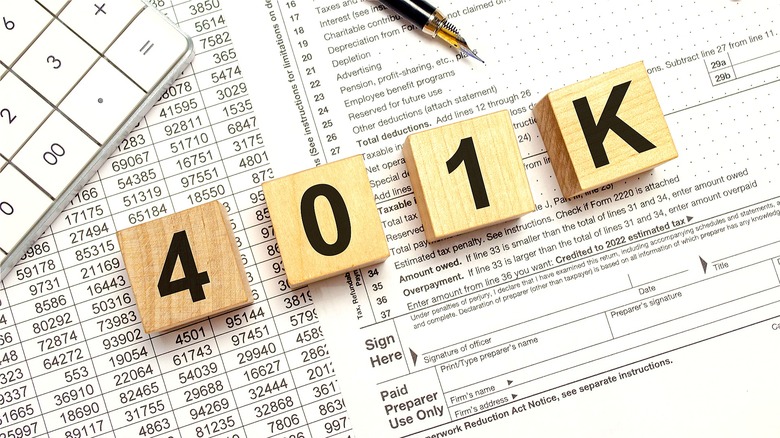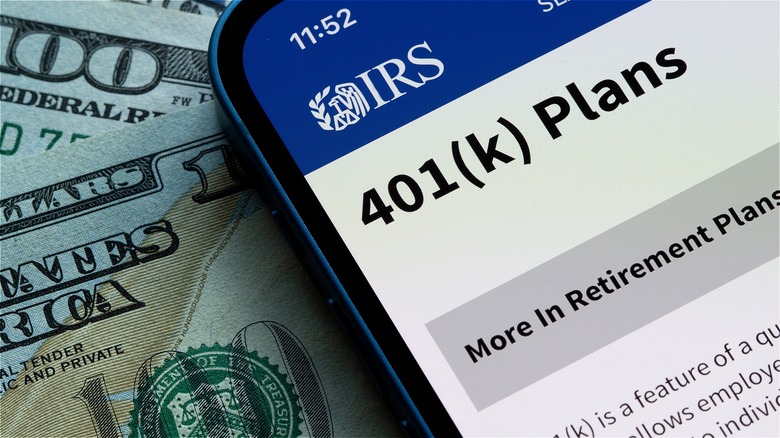What Happens To A 401(k) When You Quit?
So, you've started saving for retirement at your job, contributing to a 401(k) with every paycheck. But what happens if you decide to quit your job? What happens to the money you've already invested in your future? Well, know that any money you've contributed to your 401(k) is yours, as well as any money that's vested from your employer's matched contribution. So with this said, should you quit your job, you'll need to decide what you want to do with your 401(k) going forward. Depending on how much you've saved to this point, you have a few options.
According to data from the United States Census Bureau's 2021 Survey of Income and Program Participation, 34.6% of workers aged 15 to 64 reported having a 401(k), 403(b), 503(b), or Thrift Savings Plan, while another 18.2% had an IRA or Keogh account. Among the generations, baby boomers were most likely to have a 401(k), with 58.1%, followed by Generation X at 56.1% and millennials at 49.5%. Generation Z only had 7.7% as of 2020; however, many of this generation haven't even joined the workforce. At whatever age you start contributing to your 401(k), though, chances are likely you won't stay at the same company for the remainder of your career. For this reason, you'll need to decide on what to do with your retirement account.
If there's less than $5,000 in the account
If you've saved less than $1,000 in your 401(k) by the time you quit your job, your employer can cash the funds out to you, and some may do so automatically. Another option is to roll it over into an individual retirement account, or IRA. If your account has more than $1,000 vested but less than $5,000, your former employer can either deposit the money into an IRA or, according to Fidelity Investments, if eligible, roll your account over into a new 401(k) plan at your new workplace (if you're leaving your job for a new opportunity). Further, if you already have an IRA, let your 401(k) administrator know so that your funds can be deposited into this account (versus setting up a new one).
Note, the upper limit of $5,000 will increase after December 31, 2023. Per the SECURE Act 2.0, which expands on the Setting Every Community Up for Retirement Enhancement Act of 2019, the threshold for employers to transfer a 401(k) account of a former employee into an IRA increases from $5,000 to $7,000.
If there's at least $5,000 in the account
Once your 401(k) account reaches the $5,000 threshold (or $7,000 starting January 1, 2024), then you have four options when you leave your job. Aside from rolling the money over into an IRA or your new job's 401(k) plan, you could also leave the account with your former employer (if your former employer allows it) or withdraw the money as cash.
If you don't have a job lined up quite yet after quitting your current job, or if your new opportunity doesn't offer a 401(k) benefit, then you could leave your retirement account where it is — with your former employer. A major consideration of this option is that you can no longer contribute funds to the plan, per investment company Vanguard. As for cashing out your 401(k), unless you're going to indirectly roll it over into another retirement account (within a 60-day deadline), know that this will be considered an early withdrawal, according to the IRS, which means you will pay a 10% penalty tax on top of the 20% in taxes withheld.
If you borrowed money from your 401(k) savings
If you took out a loan out from your 401(k), you'll need to repay it. And, the time in which you have to do so diminishes greatly if you leave your job. Typically, if you take a loan out from your 401(k), you have five years to repay it, so long as you remain with your employer. If you quit, you'll need to pay the loan back before the next tax deadline, which could be as much as one year to a few months, depending on when you quit in the year.
This time frame, however, is longer than it once was. Prior to the 2017 Tax Cuts and Jobs Act, a person had 60 days to repay a 401(k) loan if they left their job. After 60 days, the outstanding balance was treated as an early withdrawal for anyone under the age of 59 ½, in which case the person would have to pay applicable taxes, along with a 10% penalty. But, the TCJA gave taxpayers a bit more time to get their accounts in order.
Borrowing against one's 401(k) savings isn't uncommon in the U.S. According to Vanguard's How America Saves 2022 report, 13% of Americans with a 401(k) account had an outstanding balance on a 401(k) loan. The average borrowed amount? $10,614. Further, this 13% is from about four-fifths of employer-sponsored retirement savings accounts, as Vanguard notes only 81% of plans offer the option to take out a loan.



